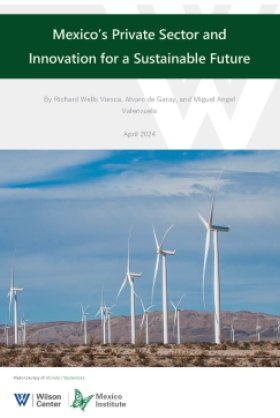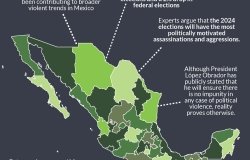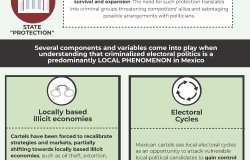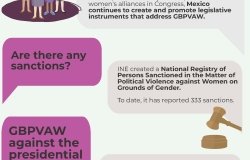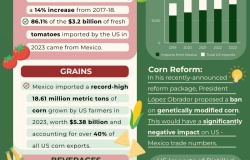Mexico Institute in the News: Outgoing President Calderon reportedly fears staying in Mexico
For the commander-in-chief of Mexico's U.S.-backed drug war to suggest he has not provided enough security to live in his country is a stunning revelation. This article looks at general public attitudes towards the outgoing administration and the incoming PRI administration. "Pena Nieto essentially proposes much the same policies that Calderon himself has endorsed," said Andrew Selee, Director of Mexico the Institute. "But in the case of PRI, they promise to get things done."
The Seattle Times, 7/01/2012
MEXICO CITY — In meetings, President Felipe Calderon has been telling guests that he and his family are likely to leave Mexico to live abroad after his term expires in December. It will be too dangerous to remain, he warns in private conversation, because powerful drug mafias might come after him.
For the commander-in-chief of Mexico's U.S.-backed drug war to suggest he has not provided enough security to live in his country is a stunning revelation — and may be seen as either an admission of failure or evidence of just how hard he has fought and how far Mexico needs to go.
As Mexicans go to the polls Sunday to vote for his successor, Calderon finds his legacy battered, his ruling party unpopular and its standard bearer, the energetic former education secretary Josefina Vazquez Mota, trailing in third place in the preelection surveys.
Limited to a single six-year term, Calderon remains personally popular, with his ratings hovering around 50 percent. Yet two of every three Mexicans recently surveyed say the country is headed in the wrong direction. According to a spokesman, Calderon is "considering a variety of options both at home and abroad . . . to contribute to finding solutions to global problems." They say "security will not be factor."
The election, said the pollster Roy Campos, "appears to be about change."
Ahead in every major survey during the three-month presidential campaign is Enrique Peqa Nieto of the Institutional Revolutionary Party, or PRI, the telegenic young face of the old corrupt party that ran Mexico as "a perfect dictatorship" for more than 70 years, before the dinosaurs, as Mexicans call them, were defeated by Calderon's predecessor, Vicente Fox, in 2000.
After 12 years of Fox and Calderon, voters appear tired of the more conservative, pro-Catholic, pro-business National Action Party, or PAN, which failed to pass the grand reforms their leaders promised to modernize the country and turn it into a kind of Brazil, the envy of Latin America.
The toll of Calderon's drug war — the sensational, medieval violence, the 60,000 dead, major cities occupied by masked soldiers — appears also to have exhausted the patience of Mexican voters.
While an overwhelming majority of Mexicans, some 80 percent, back the continued deployment of the military in the drug war, almost the same number describe violence, and human rights violations by the army as their major concern. Less than half think Calderon is making progress against the cartels, according to the Pew Research Center's most recent survey in Mexico.
Hailed by President Obama and Congress as a courageous ally in the drug war, and praised by the International Monetary Fund for his sober, solid stewardship of the economy, Calderon and his party have been on the defensive, their platform sounding like a rerun.
"What has happened is that the country is not that much different after 12 years of PAN, and that is the problem," said Raul Benitez Manuat, a specialist in North American relations at the National Autonomous University of Mexico.
When Fox was elected in 2000, and the PRI swept aside, Mexico expected major improvement after 70 years of autocratic, coercive and undemocratic rule. Fox — a rancher and former Coca-Cola distributor — was a folkloric and strong campaigner, but a frustrated reformer. The former president has conceded as much in recent weeks, saying that neither he nor Calderon could not pass important legislation. Fox even suggested that it might take an electoral sweep by the PRI and Peqa Nieto to get big things done.
Related Program

Mexico Institute
The Mexico Institute seeks to improve understanding, communication, and cooperation between Mexico and the United States by promoting original research, encouraging public discussion, and proposing policy options for enhancing the bilateral relationship. A binational Advisory Board, chaired by Luis Téllez and Earl Anthony Wayne, oversees the work of the Mexico Institute. Read more
